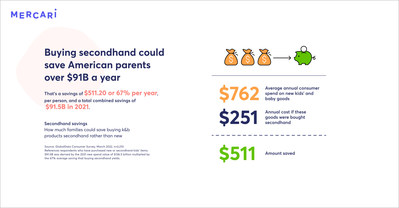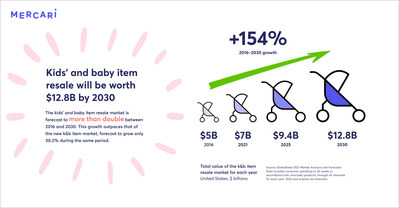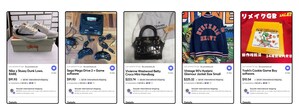The children's resale market is growing every year – especially online – unlocking more value for American families amid ongoing economic uncertainty
PALO ALTO, Calif., Aug. 24, 2022 /PRNewswire/ -- Mercari, the online marketplace that connects millions of people across the U.S. to shop and sell items that are no longer being used, today released its Reuse Report: Family Edition. As a follow-up to last year's inaugural Reuse Report, this report focuses on the resale ecosystem through the lens of American families and parents.
"Our study reveals that the resale market for kids' and baby products is expanding rapidly–especially digitally–with economic challenges being a driving factor of this trend," said John Lagerling, Mercari U.S. CEO. "Consumers are being mindful of their budgets and want to reduce waste, which are primary growth drivers in the secondhand market, and we expect this growth to accelerate through 2030."
American Families and the State of Reuse
During the last 12 months preceding our survey, two-thirds of American parents surveyed said they purchased kids' and baby products secondhand. For those who are just starting their families, this number is even higher, with more than eight in 10 buying secondhand kids' and baby items.
Fifty-nine percent of secondhand shoppers surveyed say the top reason for buying secondhand is to save money, while 27% stated they turned to resale for kids' and baby items due to rising inflation—to stretch their budgets and generate extra income by monetizing items they no longer use. Beyond value, more than one-third of secondhand buyers surveyed are concerned with sustainability.
The Opportunity Ahead
Fifty percent of parents surveyed resold childrens' items in the past 12 months, with 47% saying they did so to make extra money. American households are currently estimated to sit on a staggering 272.6 million unused kids' and baby items worth an estimated $13 billion—a figure that represents a significant opportunity for families to make money from reselling items no longer being used.
The most popular children's resale categories purchased last year based on dollar value were:
- Clothing: $1.7B
- Toys: $1.3B
- Sports & Outdoors: $635M
- Furniture: $564M
- Shoes: $554M
A Growing Market
The increased interest in buying and selling secondhand is bolstering a market that's already growing rapidly. In 2021, the secondhand kids' and baby item market was valued at $7 billion, up 11.7% from the prior year. It is forecast to grow 83.5% by 2030 when it is projected to be valued at $12.8 billion.
"In the U.S., there are 33 million households with kids under the age of 18," said Lagerling. "Given the number of things parents need to buy, and the fact that children grow out of apparel and toys quickly, it's not surprising that buying and selling preloved items is becoming recognized as a very practical option."
Other insights from Mercari's 2022 Reuse Report: Family Edition include:
- More than half of kids' and baby item resale will be online. Online shopping is driving most of the growth in resale, as digital platforms make it easier for parents to buy and sell used items. In fact, online kids' and baby item resale will more than double by 2030 and will account for 53.4% of the resale market in 2030, up from 39% in 2021.
- Luxury is in high demand. Buying secondhand isn't just confined to everyday products. One of the fastest growing segments of the market is luxury, as many parents want to equip their little ones with the latest clothing and trendy items. In 2021, luxury resale for kids' and baby items was $948 million, and it's expected to grow to $1.45 billion by 2030.
- Buying secondhand kids' and baby items could save parents over $91 billion per year. In 2021, American parents spent an average of $762 on new kids' and baby items. If purchased secondhand, the annual cost of these kids' and baby items could have been $251, which equates to a savings of $511 or 67% per year.
- Families can make nearly $400 from selling currently unused items in their homes. The 272.6 million kids' and baby items that American households have but no longer use equates to $13 billion, or $391 per household. Among those surveyed, sentimentality plays a role in why people hold on to unused kids' and baby items, with 38.4% citing this as a reason for having items they no longer use.
"Although some families keep unused kids' and baby items for sentimental reasons, many people are looking to declutter," said Neil Saunders, Managing Director of GlobalData. "Resale allows them to do this in an effective way while making a bit of extra money. At the same time, the circular economy helps other families get quality products at a cheaper price. It is a win, win situation." - Informal secondhand is booming. The part of the market where people don't sell but rather give away or hand down unused items is substantial. Three-quarters of those surveyed said they had donated or given away for free at least one kids' or baby item in the past 12 months.
For more trends and insights, download the full Reuse Report: Family Edition here.
About Mercari's 2022 Reuse Report
The Reuse Report: Family Edition is Mercari's second publication looking into the U.S. reuse market, with a focus on the resale ecosystem through the lens of American families and parents. It was produced in association with GlobalData in March 2022.
Market sizing data is produced by GlobalData. GlobalData's assessment of the secondhand market is determined through consumer surveys, retailer tracking, official public data, data sharing, store observation, and secondary sources. These inputs are used by analysts to model and calculate market sizes, channel sizes, and market shares. Consumer statistics are based on a March 2022 survey of 2,210 U.S. respondents over 18 with kids or grandkids conducted by GlobalData. Sample is nationally representative in terms of gender, age bracket, income level, and region.
"Kids' and baby", "children's" and "kids" item resale are used interchangeably in this release.
Forward-Looking Statements
This release contains forward-looking statements. Forward-looking statements include all statements that are not historical facts. The words "will", "estimate", "anticipate", "intend", "expect", "predict", "set", "forecast" and similar expressions are intended to identify forward-looking statements. These forward-looking statements are subject to a number of risks, uncertainties and assumptions. Except as required by law, Mercari has no obligation to update any of these forward-looking statements to conform these statements to actual results or revised expectations.
About Mercari
Mercari is your marketplace. Our platform connects millions of people across the U.S. to shop and sell items no longer being used. Mercari is constantly innovating to make exchanges easier, from at-home authentication to improvements in online payments and shipping. Mercari has more than 50 million downloads in the U.S. and 350,000 new listings every day, empowering the next generation to transform the way they shop. Mercari can be downloaded on app stores or accessed online through www.mercari.com.
Media Contact
Tiffany Olson
tiffany.olson@mercari.com
SOURCE Mercari

WANT YOUR COMPANY'S NEWS FEATURED ON PRNEWSWIRE.COM?
Newsrooms &
Influencers
Digital Media
Outlets
Journalists
Opted In









Share this article